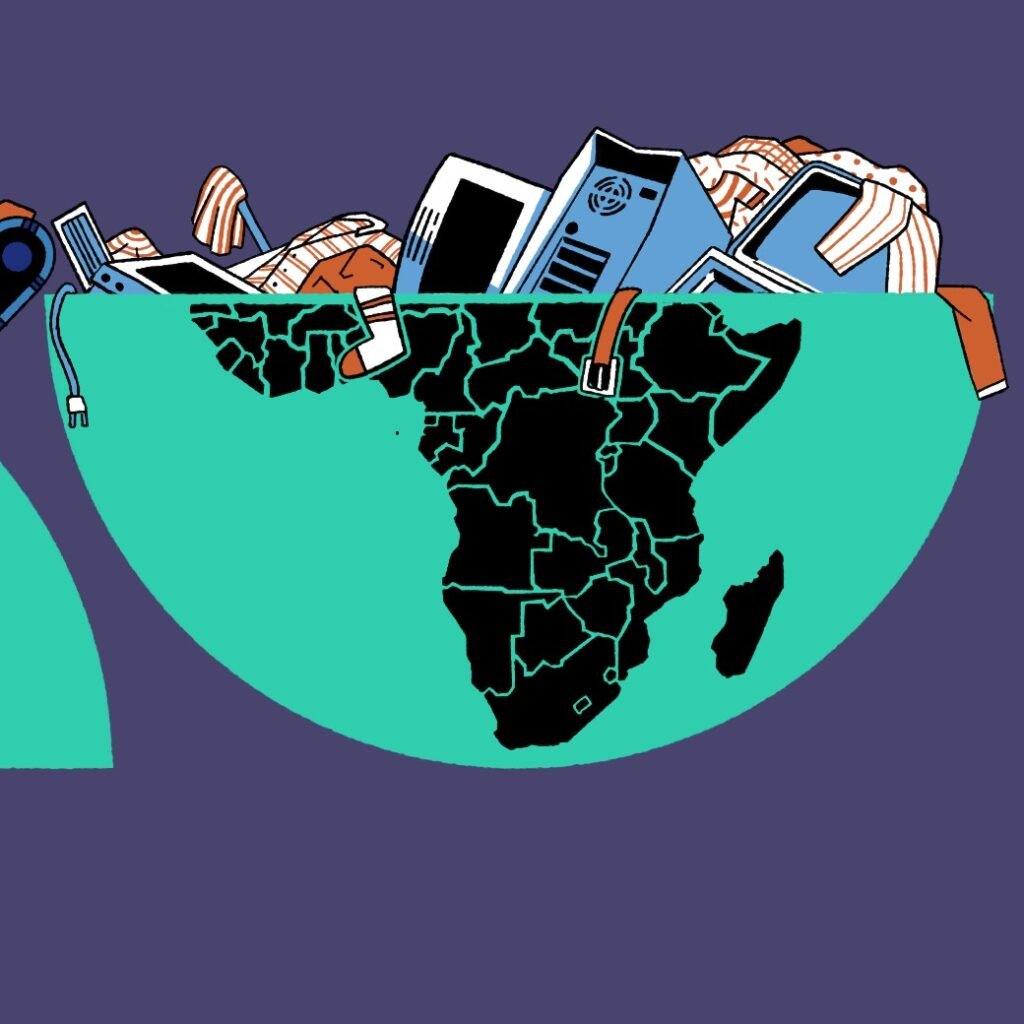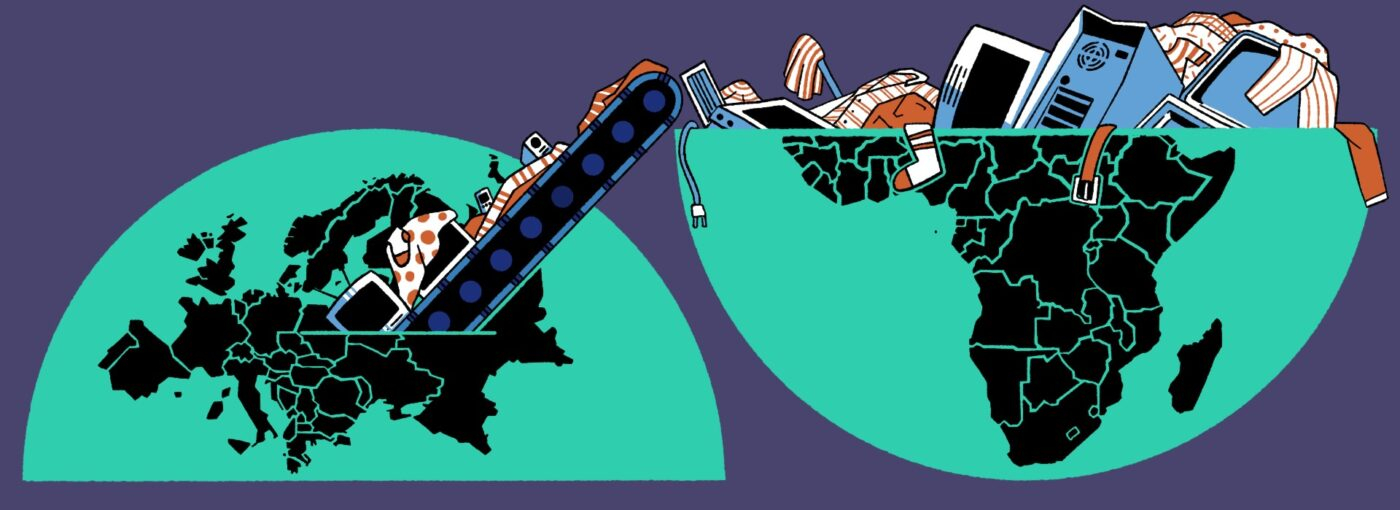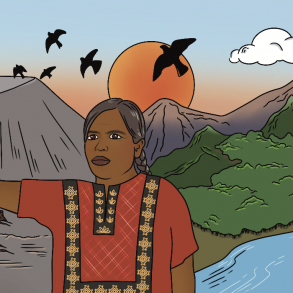The term waste colonialism was coined in 1989 at the United Nations Environmental Programme Basel Convention working group “when African nations articulated concerns about the disposal of hazardous wastes by high GDP countries into low GDP countries.”
How has waste colonialism evolved and what is the scale of the problem today?
It has evolved to describe the pollution of poorer nations by richer ones and can be witnessed with the shipping of millions of tonnes of plastic, clothing and textiles and e-waste to the Global South.
Initially, the economic benefits of importing waste seemed to outweigh the societal and environmental harms for nations in the Global South but the import has now become a social and environmental burden.
Take Ghana, for example, home to West Africa’s largest second hand clothing market. Every week, over 15m garments arrive, 40% of which will never be fit for resale, resigned to live the rest of their lives polluting the local environment or fuelling landfill fires, one of which most recently occurred in Kantamanto Market before Christmas 2022.
Where e-waste is concerned, Agbobloshie dump receives “hundreds of thousands of tons of used electronics, mainly from Western Europe and the United States” for thousands of Ghanaian community members living in severe poverty to sort, collect and try and sell. It is gruelling work with residents, including children as young as six or seven scouring the waste heaps for 12 hours a day to make enough money for their families. There are also health impacts to consider, with e-waste causing severe respiratory illnesses.
The situation in Ghana is, unfortunately, one of many and waste colonialism is not limited only to clothing waste. A huge burden has been held by the countries of South East Asia when it comes to plastic waste. In 2015, a scathing report was released, naming the countries as the worst plastic polluters in the world. Yet, what was ignored was the fact that these countries had become the world’s dumping ground. Before China restricted waste imports, the country received 45% of the world’s plastic waste. After this ban was put in place, countries like Malaysia were forced to pick up the slack, burdened with 750,000 metric tonnes of plastic waste in 2018. Indonesia was also caught in the scandal, receiving 350,000 tonnes of plastic from Germany, Australia and the US in 2018.
Waste colonialism is not only the act of burdening Global South countries with our physical waste, but also using them as scapegoats, blaming them for waste they never created.
What are its links to capitalism and overconsumption?
Like many environmental issues, capitalism lies at the core of waste colonialism.
As the Stop Waste Colonialism Team writes: “Waste itself is a byproduct of a culture of disposability and of an economic system that incentivizes a linear, or hierarchical, accumulation of value.”
Through decades of ever more enticing advertising that has permeated our cultural norms and expectations, the accumulation of items is seen as a sign of status, as necessary in leading a good life and becoming a satisfied human being.
At the same time, these companies are profit-hungry, looking to make ever-higher profits year-on-year. The production costs are squeezed, quality is reduced and care for the environment goes out the window in order to provide this profit and make products even more “accessible” which goes on to fuel more consumption.
As Diana Stuart (et al) writes in ‘Overconsumption as Ideology,’ “Capital is perpetuating overconsumption for the irrational end of self-accumulation, keeping consumers on the treadmill of consumption to reap increasing profits.”
But as we know, some countries, those in the Global North, consume exceedingly more than others and in turn are the main culprits behind the excessive amounts of waste shipped around the world every day. Take the EU for example, the biggest exporter of plastics worldwide, in 2022 it was estimated that 1.1 million tonnes of plastic was exported to non-EU countries; 31% to Turkey, 16% to Malaysia, 13% to Indonesia and 9% to Vietnam. Another large culprit is the US who in 2018, exported 961,600 tonnes of plastic, the equivalent of 68,000 shipping containers, much of which ended up in Malayisa, Thailand, Vietnam and Hong Kong.
There is a similar story for e-waste. Again, the EU sits at the top of the key culprits, exporting 22.4kg of electronic waste per person. They are followed by Australia and New Zealand who come in at 21.3kg per person, followed by the US and Canada who export around 20kg of e-waste per person. who export is one of the largest exporters of electronic waste. The previous stats were documented prior to the UK’s exit from the EU and so conceal the fact that the UK is the worst polluter across Europe, exporting toxic e-waste mainly to Ghana, Nigeria, Pakistan, Tanzania, Thailand and Ukraine.
We can understand this gaping discrepancy better through the following graph from the World bank which brings to light the disproportionate amount of waste produced largely by the Global North (including Australia) in comparison to the continents, Africa and Asia, that suffer the worst consequences of waste colonialism.
What can be done to resist this? What does change look like?
In order for us to overcome waste colonialism, action needs to be taken at multiple levels: consumer, corporate and government. As highlighted by The Or Foundation, “we need to stop wasting time pointing fingers up and down the supply chain and call for collective acknowledgment.” Let’s explore what this change looks like across fashion, plastic and electronic waste.
Fashion
When it comes to the consumer – us – it is important to switch our perspective, taking heed of the words of Mikaela Loach who highlights that we are not just consumers, we are citizens and we must be active citizens.
It is also important to acknowledge our distorted relationship with the cost of the items we buy and how we must move towards more sustainable options in a way that does not replicate the harms of the current system. Aja Barber writes about this in her book Consumed, responding to fast fashion defenders who argue that “fast fashion’s rock-bottom makes clothing affordable to people on low incomes and that the villainisation of fast fashion is an inherent villainisation of poor people.” Aja makes clear that “people buying 5-10 garments of fast fashion a year rather than 50+ are not the problem” and that “if you have the privilege of purchasing clothes multiple times a month, every month, then you probably aren’t living near the poverty line.
We must also reject the trend of eco-consumerism – green capitalism, almost – which sees us consuming at the same rate but replacing poor products with higher quality “eco-friendly” products, allowing our conscience to rest easy. Swapping out harmful products of fast fashion for more sustainable options is great, and we need more of those options – but as the saying goes, the most sustainable item is the one you already own!
We also need to be active in the ways we interact with brands and organisations, questioning them through letters, emails and social media, digging deep into their practices and challenging them to do and be better.
Plastic
Whilst considering our consumption of plastic and moving towards removing it from our personal lives, it is often unavoidable. Of course, we must all make a concerted effort to steer clear of plastics, single-use especially, but we must also understand that there are systems beyond us, fuelled largely by the fossil fuel industry, that have caused and perpetuate plastic waste issues.
In this way, we can apply the demands of the Gaia Network which were created at the AFRICA DAY 2022: FIGHTING WASTE COLONIALISM gathering with regards to plastic pollution. The demands are as follows:
- Prevent plastic waste from being dumped into the region;
- Protect existing and new legislation that upholds our right to a safe, clean and healthy environment that is toxic-free;
- Exercise their right to refuse shipments through Prior Informed Consent (PIC), especially for hazardous and environmentally unsound plastic waste;
- Stringently enforce existing legislations like the Basel and Bamako conventions, which restrict and at times prohibit waste imports, and undertake swift return-to-sender actions on illegal shipments;
- Adopt national systems that allow waste pickers to be part of all decision-making processes in waste management;
- Invest in the ongoing discussions around a global plastic treaty, to ensure that it reflects the local plastic pollution realities within the region and that attempts are made to address the problems of plastic across its entire value chain, especially through a strict cap on the production of new plastic.
The resistance is already underway when we look at national scale action. Headed up first by China in 2018, with Malaysia following in 2019 by announcing that it “will not be the dumping ground of the world,” and the Philippines invoking their sovereignty and returning 69 containers of waste to Canada. In Africa, 34 nation-states have also passed laws to ban plastic items.
Electronics
When it comes to e-waste, the approach is again, multifaceted. A huge amount of responsibility lies with tech companies and more specifically the design of their products. Moving from planned obsolescence, the practice of designing products with intentionally short lifespans, and implementing right to repair practices, extending the lifetime of electronic products and allowing them to be mended rather than thrown away when broken or faulty.
On the ground, a formalisation of electronic waste recycling is essential. Many of the workers in countries like Ghana and Nigeria are ‘informal’ meaning they have no protection or support from the state or companies and little reward for their gruelling work. Formalising the industry by investing in established e-waste facilities, if done well, could provide hundreds of thousands of people with secure jobs.
Lastly, and a point that is applicable across all solid waste materials and their pollution of the least responsible countries, a move towards Extended Producer Responsibility is essential This requires “companies that make products to be responsible for the management and disposal of them at the end of their lives.”
What action is taking place on the ground?
Back in 2022, activists from the Philippines, took a stand and sent plastic waste back to Nestle as part of their campaign ‘Break Free From Plastic, supported by Greenpeace Philippines’. Alongside the waste, they sent letters from youth and communities to demand that the company stop greenwashing its plastic pollution.
“We’re here to tell Nestle to stop faking it…they haven’t stopped transferring the burden of pollution onto people, while they rake in massive profits delivered by a destructive business model. We’re calling on Nestle to do the right thing and start massively reducing their plastic production.” – Greenpeace campaigner Jefferson Chua.
Earlier this year, Yvette Tetteh, an athlete, creative, agribusiness entrepreneur and a Board Member of The Or Foundation, swam 450km of the Volta River, taking water samples and engaging communities along the way. In addition, 12 storytellers prepared stories following along the route of the swim to shine a light on the challenges and the joys facing some of the communities who make their home along the Volta and to raise awareness about textiles pollution in Ghana. In Ghana, the incredible team at The Or Foundation have launched their #stopwastecolonialism campaign which is driven by the community at Kantamanto Market You can donate through their website to support their ongoing work at the No Fast Fashion Lab which supports thousands of market sellers and repurposes thousands of kilos of wasted garments.
Incredible work is also being done on the ground by The International Alliance of Waste Pickers, a coalition of over 400 organisations across 30 countries across Latin America, Africa and Asia.
“We’ve helped develop organisations in Africa, Latin America and Asia, and participated in several United Nations Framework Convention on Climate Change (UNFCCC) meetings since 2009, where thanks to the support provided by the Global Alliance for Incinerator Alternatives (GAIA) we advocated for alternative funding mechanisms to support fair and just solutions to climate change” – The International Alliance of Waste Pickers Website
Myth busting
“Colonialism and its repercussions are a thing of the past.”
We attribute the effects of colonialism to evil actors looking only to extract and exploit. We can see this in the fact that only 10-20% of the clothes we give away to charity, what we see as a positive deed, get recycled and much of it arrives in countries like Ghana. It was found that around a third of the clothes donated to Oxfam were sent to Senegal with 1-3% actually ending up in the charity shops themselves. Or the fact that only around 5-6% of plastic waste gets recycled. As Max Liboiron comments, in his book Pollution is Colonialism, colonialism is “a set of contemporary and evolving land relations that can be maintained by good intentions and even good deeds.”
“Waste exports from the Global North benefit Global South Economies.”
Those who benefit from the export of waste to poorer countries, those who would rather have their waste out of sight and out of mind, often ease their consciences by believing that waste support the economies of developing nations, attributing the import of waste t increased GDP. Yet these arguments ignore the very real impacts, harmful to not only the environment but to public health in the countries the waste is dumped on. From respiratory diseases caused by long exposure to e-waste, to landfill fires that burn from excess clothing shipped to Ghana, the benefit is hard to see. And if we are to look at the situation economically, we see that local fashion industries have also suffered as a result.
“Most people abroad go to bed thinking they have done something good for Africans by discarding their unwanted clothing but the truth is it is actually harming our economy. Local manufacturers cannot compete with the cheap prices and most of the clothing sent is not wanted by Africans. They end up as waste in landfills like this all over the country,” says Ernest Ijawan, a manager of the Kpone landfill in Ghana.
What can you do?
Organisations:
- Stop Waste Colonialism Position Paper from The Or Foundation: Leveraging Extended Producer Responsibility to Catalyze a Justice-led Circular Textiles Economy
- Living Water Agbetsi Expedition: The Expedition | Agbetsi
- Fashion Revolution
- Collective Fashion Justice
Articles:
- ‘Waste colonialism’: world grapples with west’s unwanted plastic: ‘Waste colonialism’: world grapples with west’s unwanted plastic
- This Is Not Your Goldmine. This Is Our Mess – Liz Rickets for Atmos
- Britain’s dirty secret: the burning tyres choking India – George Monbiot for The Guardian
- Colonial Ideologies of Waste: Implications for Land and Life – Europe Now
- ReDress the Future: on sustainable solutions and holding the fashion industry to account – Shado Magazine
- What is Greenwashing? – Shado Magazine
Books:
- Pollution is Colonialism by Max Liboiron
- Consumed by Aja Barber
- Rubbish Belongs to the Poor: Hygienic Enclosure and the Waste Commons by Patrick O’Hare
Watch:
- AFRICA DAY 2022 | Stop Waste Colonialism Gathering Video: AFRICA DAY 2022 | Stop Waste Colonialism
- The True Cost Documentary
- Plastics and Toxic Colonialism – Prof Alice Mah












